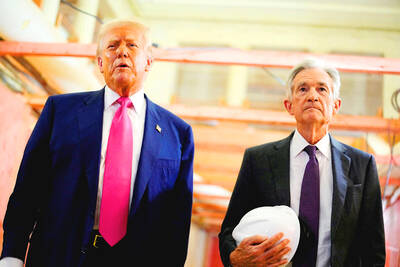Taiwan Liposome Company Ltd (TLC, 台灣微脂體) announced yesterday that it would introduce its ProFlow product to Japan in cooperation with Japanese pharmaceutical retailer Nihon Generic Co.
The pact will make ProFlow the first drug developed by Taiwanese to enter a leading international pharmaceutical manufacturing market under its private brand.
TLC said the Japanese market for Prostaglandin E1 (PGE1) — a major ingredient of ProFlow — is worth NT$10 billion (US$329 million).
It is estimated that ProFlow will be able to obtain a 45 percent market share in Japan within five years of its launch.
“The Taiwanese market is rather small, so it is important for us to expand our overseas market,” said Keelung Hong (洪基隆), TLC founder and chairman, at a press conference yesterday.
Japan is the second-largest pharmaceutical market in the world after the US, and is rather difficult to enter, Hong said.
Since TLC lacks the resources to market its products overseas, the deal with Nihon Generic is a crucial step for TLC in entering the international market.
The company has plans to enter the South Korean and Chinese markets, which have market values of NT$500 million and NT$1.5 billion respectively, Hong said.
TLC’s announcement came as Bio Taiwan, Asia’s largest biotechnology trade fair, opened in Taipei, showcasing cutting-edge medical and healthcare products.
The trade fair is being held alongside a healthcare and biomedical cosmetology exposition.
The two shows will run through Sunday and feature nearly 430 manufacturers at 850 booths at Taipei World Trade Center’s Exhibition Hall 1. The two shows are expected to attract 80,000 visitors.
Many pharmaceutical and biotech companies are showcasing their latest biotechnology products.
PhytoHealth Corp (懷特新藥科技), a Taiwanese firm listed on the local stock market, is presenting PHNO12 (PG2), a complementary and alternative medicine for treating advanced-stage cancer patients.
SunTen Phytotech (順天生物科技), which will soon go public in Taipei, is showcasing its biotechnology innovations, which include traditional Chinese medicines.
In other developments, International Technical and Brains Services (ITBS), a Japanese biomedical manufacturer, signed a Memorandum of Understanding (MOU) at the show with a Taiwanese company, Medigreen Biotechnology Corp (鴻亞生物科技), to collaborate on production and marketing in both countries.
Showcasing its ginseng fruits, ITBS president Sei Tomio claimed the product could help “cure” AIDS, cancers and normalize body conditions.

IN THE AIR: While most companies said they were committed to North American operations, some added that production and costs would depend on the outcome of a US trade probe Leading local contract electronics makers Wistron Corp (緯創), Quanta Computer Inc (廣達), Inventec Corp (英業達) and Compal Electronics Inc (仁寶) are to maintain their North American expansion plans, despite Washington’s 20 percent tariff on Taiwanese goods. Wistron said it has long maintained a presence in the US, while distributing production across Taiwan, North America, Southeast Asia and Europe. The company is in talks with customers to align capacity with their site preferences, a company official told the Taipei Times by telephone on Friday. The company is still in talks with clients over who would bear the tariff costs, with the outcome pending further

NEGOTIATIONS: Semiconductors play an outsized role in Taiwan’s industrial and economic development and are a major driver of the Taiwan-US trade imbalance With US President Donald Trump threatening to impose tariffs on semiconductors, Taiwan is expected to face a significant challenge, as information and communications technology (ICT) products account for more than 70 percent of its exports to the US, Chung-Hua Institution for Economic Research (CIER, 中華經濟研究院) president Lien Hsien-ming (連賢明) said on Friday. Compared with other countries, semiconductors play a disproportionately large role in Taiwan’s industrial and economic development, Lien said. As the sixth-largest contributor to the US trade deficit, Taiwan recorded a US$73.9 billion trade surplus with the US last year — up from US$47.8 billion in 2023 — driven by strong

AI: Softbank’s stake increases in Nvidia and TSMC reflect Masayoshi Son’s effort to gain a foothold in key nodes of the AI value chain, from chip design to data infrastructure Softbank Group Corp is building up stakes in Nvidia Corp and Taiwan Semiconductor Manufacturing Co (TSMC, 台積電), the latest reflection of founder Masayoshi Son’s focus on the tools and hardware underpinning artificial intelligence (AI). The Japanese technology investor raised its stake in Nvidia to about US$3 billion by the end of March, up from US$1 billion in the prior quarter, regulatory filings showed. It bought about US$330 million worth of TSMC shares and US$170 million in Oracle Corp, they showed. Softbank’s signature Vision Fund has also monetized almost US$2 billion of public and private assets in the first half of this year,

POWELL SUCCESSOR: US Fed Governor Adriana Kugler’s resignation gives Donald Trump an opening on the board, potentially accelerating his decision on the next chair US President Donald Trump suddenly has a chance to fill an opening at the US Federal Reserve earlier than expected, after Fed Governor Adriana Kugler announced her resignation on Friday. It might also force him to pick the next Fed chair months sooner than he had anticipated. “The ball is now in Trump’s court,” LH Meyer/Monetary Policy Analytics Inc economist Derek Tang said. “Trump is the one who’s been putting pressure on the Fed to do this and that, and Trump says he wants to have his own people on. So now he has the opportunity.” Kugler’s exit unfolds amid unprecedented public pressure